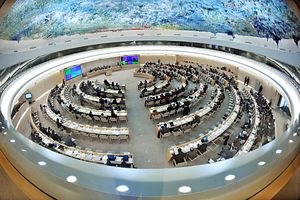GENEVA – On October 28, the UN General Assembly held the election for Human Rights Council. The 194-member states voted in a secret balloting process for 14 new members. Russia, which will finish its current term in the Human Rights Council on December 31, wanted to retain its seat but it has failed.
Russia’s failure is important for two reasons. First, it is almost impossible for one of the five powerful UN Security Council permanent member states to lose any UN election — yet that has just happened. Second, the vote was a small but symbolic victory for the international community, sending the message that countries which commit human rights atrocities have no moral right to be in the UN Human Rights Council.
Russia has been facing harsh criticism over its support for the Bashar al-Assad regime in Syria, where Moscow has participated in military operations that took thousands of civilian lives. Furthermore, Russia’s domestic human rights record is growing worse each year. By rejecting Russia’s candidacy, the UN member states sent a message to Moscow about Russia’s behavior with regard to international norms and human rights. UN Watch, a UN watchdog group, said after the vote that “the non-election of Russia shows that the nations of the world can reject gross abusers of human rights.”
It is worth highlighting the crucial role played by international human rights organizations campaigning ahead of the election. A group of 87 international organizations and NGOs issued a joint statement that called on UN member states to reject Russia’s candidacy. The statement recalls UN General Assembly Resolution 60/251, which asks that those voting for members of the Human Rights Council “take into account the contribution of candidates to the promotion and protection of human rights.”
“Member states should particularly consider Russia’s indiscriminate attacks, its substantial weapons deliveries to the Syrian government, and its efforts to prevent impartial accountability for serious crimes in Syria. Moreover, member states should consider Russia’s decision, on October 8, 2016, to veto a credible draft UN Security Council resolution aimed at ending atrocities in Aleppo. This was its fifth use of a veto on a resolution concerning Syria at the Security Council,” the human rights organizations said.
Apart from the Syrian issue, Russia has a poor human rights record within its own borders. Human Rights Watch’s special report on Russia says that the Kremlin’s crackdown on civil society, media, and the Internet took a more sinister turn in 2015. The Russian government has intensified harassment and persecution of independent critics, each year adopting new harsh laws. For example, Russia’s foreign agent law has completely paralyzed civil society in the country.
Moreover, Russian President Vladimir Putin had been added to the list of “predators” of press freedom by Reporters Without Borders (RSF), placing Putin alongside others such as the Islamic State, North Korean leader Kim Jong-un and Chinese leader Xi Jinping. “Russia adopted draconian laws since Putin’s return to the Kremlin in 2012 and the climate has become very oppressive for those who question the new patriotic and neo-conservative discourse or just try to maintain quality journalism,” according to RSF experts.
Physical elimination of those who criticize the status quo has become normal in Russia. The Committee to Protect Journalists gives a list of 56 journalists who are killed for their work since 1992. And in 86 percent of these cases, there have been no justice for these deaths. The list of assassinated Russian politicians has been evolving as well, adding new names. In 2006, Alexander Litvinenko, who accused Putin of corruption and of orchestrating the bombings that provoked the the Second Chechen war, was poisoned with radioactive polonium-210 even after fleeing Russia and being given British nationality. In February 2015, political opposition leader Boris Nemtsov was assassinated.
Russian Ambassador Vitaly Churkin, who worked hard to secure his country’s seat at the HRC for the next term, told reporters that Russia has been in the HRC for several years and is eligible to run next year again. He was confident Russia would get back in.
“It was a very close vote and very good countries competing, [including] Croatia, Hungary. They are fortunate because of their size, they are not exposed to the winds of international diplomacy. Russia is very exposed,” said Churkin.
Maybe the Russian envoy is referring here to the example of the United States. Washington lost in the Human Rights Council election in 2001 but was re-elected in 2002. However, Russia needs at least a pause to step away and reweigh its policy toward Syria and own human rights records.
Besides Russia, there were also harsh campaigns against re-electing China and Saudi Arabia to the UN rights body. Freedom House made a statement calling on countries to reject the candidacy of all three countries, saying that governments which abuse human rights and limit the fundamental freedoms of their citizens cannot be elected. “Electing China, Russia, and Saudi Arabia would undermine the mission and principles of the Council. These are countries who flagrantly violate fundamental rights by unlawfully detaining their own citizens for dissent, and in the case of Russia and Saudi Arabia by the wanton bombing of civilians in Syria and Yemen. China in the past led blatant obstruction efforts within the Council and has targeted citizens seeking UN protection.” said Daniel Calingaert, acting president of Freedom House.
However, unlike Russia, both China and Saudi Arabia were re-elected to the Human Rights Council. Saudi Arabia famously does not accord equal status to women and conducts a high number of executions each year; Riyadh has also killed 4,000 civilians in a bombing campaign in Yemen. And China, which has an appalling human rights records, recently brought its crackdown on dissent to a new level by kidnapping human rights defenders and other dissidents from third countries.
































